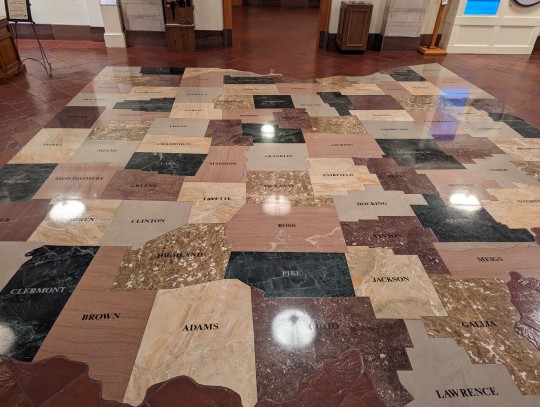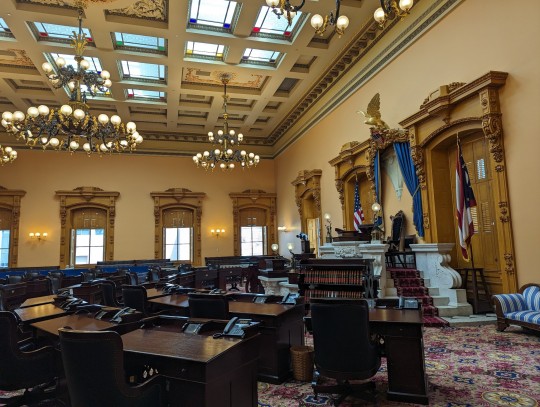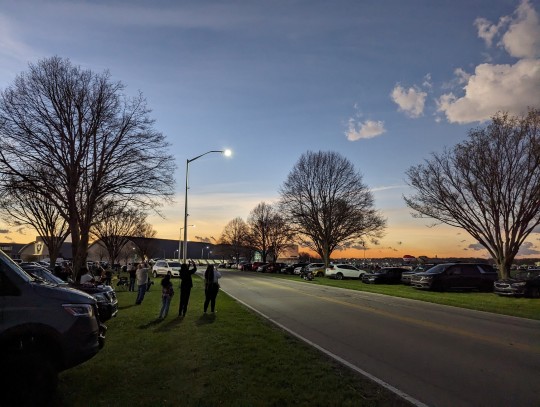#Monitor 2024 Presidential Election
Explore tagged Tumblr posts
Link
Marines Arrest U.S. Ambassador to U.N. For Treason — Wanted “Blue Helmet” “Peacekeeping Force” to Monitor 2024 Presidential Election
United States Marines on Thursday arrested U.S. Ambassador to the United Nations Linda Thomas-Greenfield on charges of conspiracy to commit election fraud and treason after implicating her in a heinous plot to have United Nations “observers” and “peacekeepers” monitor polling locations on Election Night 2024, sources in General Eric M.
#MarinesArrest#Marines Arrest#us ambassador#usambassador#UN#treason#bluehelmet#blue helmet#2024 elections#2024election#presidential election#presidentialelection#Monitor 2024 Presidential Election#united states marines
80 notes
·
View notes
Text
If you crave calm updates on the US elections, try the Christian Science Monitor's live coverage.
9 notes
·
View notes
Text
I must not recheck the incomplete election results.
Rechecking is the mind-killer.
Rechecking is the little-death that brings total obliteration.
I will face the (fully counted) election results.
I will permit them to pass over me and through me.
And when they have gone past, I will turn the inner eye to see their path.
Where the election results have gone there will be nothing. Only the path forward will remain.
#really struggling not to monitor them every second of the day#but that will not change the results#and I do not need to put myself through that#election 2024#us elections#2024 presidential election#thereallyreallylatebird#dune reference
7 notes
·
View notes
Text
Nikki Haley believes that frozen embryos are babies. She said this in response to a decision by the Alabama Supreme Court which reads like it was written by a fundamentalist extremist.
Haley addressed the issue in a pair of TV interviews hours apart, days after Alabama's high court said that frozen embryos in test tubes should be considered children, rattling doctors and patients in reproductive medicine as well as raising legal questions. "Embryos, to me, are babies," Haley told NBC News. "When you talk about an embryo, you are talking about, to me, that's a life. And so I do see where that's coming from when they talk about that." Asked in a CNN interview later on Wednesday about the remarks, she said: "I didn't say that I agreed with the Alabama ruling."
The Alabama ruling has created turmoil in hospitals and clinics in the state offering in-vitro fertilization (IVF).
The ruling was greeted by widespread shock in Alabama, which has one of the nation's strictest abortion laws, according to news reports, with patients confused about whether to proceed with IVF and others wondering whether to move their embryos. The University of Alabama at Birmingham paused in-vitro fertilization after the state supreme court ruling, due to fear of prosecution and lawsuits, a hospital representative said.
Haley's comment is in the same category of silliness as Mitt Romney's 2011 comment that "corporations are people".
The Alabama decision is another demonstration of how Republicans are trying to crush reproductive freedom in the United States. And Haley demonstrated that just because she's running against Trump doesn't mean that she's a moderate on the issue.
The only way to protect reproductive freedom in the US is to vote Democratic for every office on the ballot. Republicans are pathologically obsessed with reproduction. They spent 49 years working to overturn Roe v. Wade.
Biden blasts Alabama Supreme Court's IVF ruling as Harris, campaign blame Trump
Keep Republicans away from your gonads. Register and vote.
I Will Vote
These people in Walker County helped elect the Alabama Supreme Court which consists of nine Republicans. They will never miss a chance to vote for wingnuts. If you skip an election or waste votes on third-party losers then people like these voters will elect MAGA Republicans in your absence.

#alabama#in-vitro fertilization#ivf#alabama supreme court#reproductive freedom#nikki haley#frozen embryos are babies#gop presidential nomination#roe v. wade#the sanctity of reproductive freedom#a woman's right to choose#donald trump#republicans will monitor your gonads#vote democratic to keep government out of your bedroom and out of your embryos#vote blue no matter who#election 2024
9 notes
·
View notes
Text
Somaliland NEC Establishes Media Ethics Committee Ahead of Elections
#Somaliland's @SLNECHQ takes a crucial step towards ensuring fair elections by establishing a Media Ethics Committee to monitor media conduct, uphold journalistic integrity, & prevent misinformation. #SomalilandElections2024
Continue reading Somaliland NEC Establishes Media Ethics Committee Ahead of Elections
#Committee for Monitoring the Code of Conduct and Ethics of the Media (CMCCEM)#Elections#Media#Media and democracy#National Electoral Commission (NEC)#Political Parties Elections#Presidential Elections#Somaliland#Somaliland Elections 2024
0 notes
Text
The target is you, voter. Russia, China, Iran, and other bad actors sought to interfere in the run-up to today’s US elections, according to research by the Atlantic Council’s Digital Forensic Research Lab (DFRLab), which has been monitoring online trends along with statements by governments, private companies, and civil society in its Foreign Interference Attribution Tracker. As DFRLab experts detail below, this year’s malign efforts in many ways surpass previous influence campaigns in sophistication and scope, if not in impact—and they are expected to continue well after the polls close.
Tipping the scale
“By sheer volume, foreign interference in the 2024 US election has already surpassed the scale of adversarial operations in both 2016 and 2020,” Emerson says.
Dina notes that each US adversary played to its strengths. For example, Iran and China “attempted to breach presidential campaigns in hack-and-leak operations that raise concerns about their cyber capabilities during and after the elections,” she tells us.
At the same time, the United States is more prepared than it was in previous election cycles. Russian efforts in 2016 “made foreign interference a vivid fear for millions of Americans,” Emerson notes. “Eight years later, the US government is denouncing and neutralizing these efforts, sometimes in real time.”
In fact, Graham tells us, “the combined actions by the US departments of Justice, Treasury, and State against two known Russian interference efforts was the largest proactive government action taken against election influence efforts before an election.”
Doppelgangers and down-ballot races
US officials this week called Russia “the most active threat,” and it’s easy to understand why. Emerson notes Russia’s “ten-million-dollar effort to infiltrate and influence far-right American media,” alongside the “Doppelganger” network, which has spread “tens of thousands of false stories and staged videos intended to undermine election integrity in the swing states of Pennsylvania, Georgia, and Arizona.” Increasingly desperate, Russian actors have even sought to shut down individual polling places with fake bomb threats, he adds.
Meanwhile, China has focused on “down-ballot races instead of the presidential election to target specific anti-China politicians,” Kenton explains. Using fake American personas and generative artificial intelligence, China-linked operations have appeared across more than fifty platforms. Perhaps surprisingly, Kenton adds, “attributed campaigns appeared sparingly” on the Chinese-owned platform TikTok and far more often on Facebook and X.
Faith, fakes, and falsehoods
“The primary aim is to erode Americans’ faith in democratic institutions and heighten chaos and social division,” Kenton explains, and thus to undermine the ability of the US government to function so it will have less bandwidth to contain adversarial powers.
“Some of the fake and already debunked narratives and footage circulating before the elections will likely continue to be amplified by foreign threat actors well after November 5,” Dina predicts. Expect to see activity around the submission of certificates of ascertainment on December 11, the December 17 meeting of the electors to formally cast their votes, and through inauguration day on January 20.
And in a post-election period where the results will likely be contested, Graham thinks there’s a “high likelihood” that foreign actors will “cross a serious threshold” from pre-election attempts to broadly influence American public opinion in service of their geopolitical interests to “direct interference” by trying to mobilize Americans to engage in protests or even violence.
Nevertheless, Graham points out that the high volume of foreign-influence efforts observed during this year’s election cycle so far does not appear to have had a significant impact in terms of changing Americans’ opinions or behavior.
The consequences of foreign disinformation, Emerson adds, should be assessed against “the far more viral, sophisticated, and dangerous election-day falsehoods that Americans spread among themselves.”
83 notes
·
View notes
Text
The whole article is worth a read but I pulled some money quotes.
In the conference room, Gambashidze was laying out his plans for a new target: Along with his colleagues, he began drafting what would become known as the Good Old USA Project. The project was supposed to influence the outcome of the US presidential election in favor of former president Donald Trump, specifically targeting certain minorities, swing-state residents, and online gamers, among others, in a scheme that included a full-time team dedicated to the cause.
They also specifically wanted to erode support for Ukraine and Biden and targeted gamers as the back-bone of the right-wing movement.
As well as getting Trump elected, the campaign’s secondary goals included increasing the percentage of Americans who believe the US is doing too much to aid Ukraine to 51 percent, and reducing the percentage of Americans who have confidence in President Joe Biden down to 29 percent. The plan lists a variety of audiences the campaign specifically wants to target, including residents of swing states, American Jews, “US citizens of Hispanic descent,” and the “community of American gamers, users of Reddit and image boards, such as 4chan.” The document describes this category of gamers and chatroom users as the "backbone of the right-wing trends in the US segment of the Internet.” In recent months, the Trump campaign has embraced many of the most influential figures within these communities, including many who share deeply misogynistic rhetoric on a regular basis.
And of course, they targeted social media, making sleeper groups intended to sway the election.
Meanwhile, Gambashidze and his colleagues used Facebook, Twitter, and Reddit to create community groups of Trump supporters, with one sample name given as “Alabama for America the Great.” The document also reveals that the Russians planned to use Reddit as a vector to disseminate their propaganda as it is a platform “free from democratic censorship.” Gambashidze’s plan outlined how Doppelganger would create 18 “sleeper cells” on social media platforms in each of the swing states, which would “at the right moment, upon gaining momentum, become an important instrument of influencing the public opinion in critically important states and portals used by the Russian side to distribute bogus stories disguised as newsworthy events.” It’s unclear if these so-called sleeper cells were created and, if so, whether they are still present on the platform.
They also targeted and looked at influencers, including politicians.
One of the key aspects of the Kremlin’s campaign is also to engage with influencers. According to the FBI’s affidavit, Gambashidze’s company “extensively monitors and collects information about a large number of media organizations and social media influencers.” According to the Good Old USA project document, the Kremlin was seeking to work with influencers who are “proponents of traditional values, who stand up for ending the war in Ukraine and peaceful relations between the US and Russia, and who are ready to get involved in the promotion of the project narratives.” Among the types of influencers listed as possible collaborators are actors, politicians, media representatives, activists, and clergymen.
41 notes
·
View notes
Text
Marco Margaritoff at HuffPost:
Dominion Voting Systems released a pointed statement Saturday following remarks from billionaire Elon Musk and Rep. Marjorie Taylor Greene (R-Ga.), who have reiterated debunked conspiracy theories that the 2020 election was stolen from Republican nominee Donald Trump. The electronic voting machine company reached a record-breaking settlement last year after suing Fox News for spreading disproven claims that its machines had facilitated ballot fraud in 2020. Dominion said Saturday that it is “closely monitoring claims around the 2024 election” that echo those allegations.
“We strongly encourage people to rely upon verified, credible sources of election information - sources that can explain the many layers of physical, operational, and technical safeguards that exist to protect the integrity of our elections,” Dominion wrote in its statement. “We remain fully prepared to defend our company and our customers against lies, and to seek accountability from those who spread them,” the company added. Musk has thrown his full weight behind Trump. He promoted the false assertion that Dominion manipulated the election in 2020 at his first solo event to support Trump’s campaign on Thursday, insinuating without proof that “some very strange things” happened to people’s votes. “When you have mail-in ballots and no proof of citizenship, it becomes almost impossible to prove cheating, is the issue,” Musk said at a Pennsylvania town hall.
“There’s always this question of, say, the Dominion voting machines,” Musk continued. “It is weird that, I think, they were used in Philadelphia and in Maricopa County [in Arizona] but not in a lot of other places. Doesn’t that seem like a heck of a coincidence?” Dominion — which also sued former Trump attorneys Rudy Giuliani and Sidney Powell, along with other TV networks like Newsmax, for making defamatory claims about its machines — reacted strongly to Musk’s comments in a separate statement Friday to multiple media outlets. [...] “These are not matters of opinion. They are verifiable facts.” Separately, Greene — known for conspiratorial rhetoric, like her recent assertion that a shady “they” can “control the weather” — appeared on Alex Jones’ InfoWars network on Friday, where she claimed that a Dominion machine “changed” the ballot of a voter in her district. (Early voting began in Georgia in the 2024 presidential election earlier this week.)
Right-wing loons MTG and Alex Jones revive nonsense conspiracy theories about Dominion Voting Systems.
#Election Denialism#Marjorie Taylor Greene#Elon Musk#The Big Lie#Dominion Voting Systems#Donald Trump#2024 Presidential Election
13 notes
·
View notes
Text
August 21, 2024
Texas’s highest criminal court announced on Wednesday it would again consider the case of Crystal Mason, a Texas woman who was sentenced to five years in prison for trying to cast a provisional ballot in the 2016 presidential election when she was ineligible to vote.
The announcement from the Texas court of criminal appeals is the latest step in a nearly eight-year case that has captured national attention because of the severity of Mason’s sentence. Mason, who lives in Fort Worth, attempted to vote in 2016 while on supervised release – which is like probation – for a federal tax felony. Texas, like several other US states, bars people convicted of a felony from voting until they have completed their sentence.
[...]
Sorrells has also defended the decision to appeal the case. “I want would-be illegal voters to know that we’re watching,” Sorrells said in May. “And that we’ll follow the law and we will prosecute illegal voting.”
The timing is no coincidence. This is purely voter intimidation. Once again, they're trying to make an example of this woman. It's blatant, and it's disgusting. These people are evil. And because I know some people will try it - it's not even that she was charged and convicted (even though the people monitoring her release testified that they did not tell her she couldn't vote), the controversy was in her sentencing. Five years in prison for not understanding that you can't vote even while on probation for a felony crime is ridiculous.
16 notes
·
View notes
Text

What’s Next After Joe Biden Steps Down from the 2024 Elections?
The political landscape in the United States has shifted dramatically with President Joe Biden’s decision to step down from the 2024 presidential race. As the Democratic Party grapples with this unexpected development, several key questions and potential scenarios emerge about the future of the party and the upcoming election.
Immediate Reactions and Interim Leadership
Following Biden’s announcement, Vice President Kamala Harris has become the most likely interim leader of the Democratic Party. Her role as vice president positions her as a natural successor, and she has already garnered significant attention and support from various factions within the party. However, her potential candidacy will need to be officially endorsed by the Democratic National Committee (DNC).
Potential Candidates and Primaries
The race for the Democratic nomination is now wide open, with several high-profile politicians likely to throw their hats into the ring. Potential candidates include:
Kamala Harris: As the current vice president, she has a strong platform but will need to consolidate support from various party factions.
Gavin Newsom: The Governor of California has been seen as a rising star in the party, known for his progressive policies and strong leadership.
Pete Buttigieg: The Secretary of Transportation and former mayor of South Bend, Indiana, has maintained a significant national profile since his 2020 presidential run.
Elizabeth Warren: The Senator from Massachusetts remains a powerful voice within the progressive wing of the party.
Amy Klobuchar: The Senator from Minnesota offers a more centrist approach that could appeal to moderate voters.
The DNC will need to organize a series of debates and primaries to allow these candidates to present their platforms and vie for the nomination.
Impact on the General Election
Biden’s decision to step aside has significant implications for the general election. The Democratic Party must quickly rally around a new candidate who can unite the party and appeal to a broad base of voters. This includes addressing concerns about Biden’s health and ensuring that the new candidate can effectively challenge the Republican nominee, presumably former President Donald Trump.
Strategic Shifts and Campaign Focus
With a new candidate, the Democratic Party may need to adjust its campaign strategies. Key issues that will likely be emphasized include:
Healthcare and Pandemic Response: Continuing Biden’s efforts in managing the COVID-19 pandemic and improving healthcare access.
Economic Recovery: Building on the current administration’s efforts to strengthen the economy and address income inequality.
Climate Change: Promoting aggressive policies to combat climate change, a central issue for many Democratic voters.
Social Justice: Ensuring that issues of racial and social justice remain at the forefront of the campaign.
Republican Response
The Republican Party will closely monitor the Democratic transition, adjusting their strategies accordingly. Trump’s campaign is likely to capitalize on the perceived instability within the Democratic Party, using it as a point of criticism. However, the Republicans will also need to address their internal challenges and unify their base.
Voter Mobilization and Engagement
The uncertainty surrounding Biden’s departure places a premium on voter mobilization and engagement. Both parties will intensify efforts to reach out to key demographics, including young voters, minorities, and independents. The importance of voter turnout cannot be overstated, especially in swing states that will determine the election’s outcome.
Conclusion
Joe Biden’s decision to step down from the 2024 election marks a significant turning point in American politics. The Democratic Party faces the urgent task of selecting a new candidate who can inspire and unite voters. Meanwhile, the Republicans will seek to exploit this transition to their advantage. As both parties navigate this evolving landscape, the 2024 election promises to be one of the most consequential in recent history, shaping the direction of the United States for years to come.
12 notes
·
View notes
Text










8/5/2024 - 8/8/2024
Time for the latest installment of my "Don't post about a vacation until after I'm back home" series:
We were killing time in a mall before leaving for the airport on Friday when I noticed the overhead lights swaying in a store. Felt like a massive train was rolling by just outside, but I knew we weren't close enough to the NJ Transit line to actually feel it. Turns out it was a ⋆⭒˚.⋆4.8 earthquake⋆⭒˚.⋆.
Our flight got delayed for three hours while the runway was inspected for damage. While waiting to get dinner in the terminal, the lights started swaying again and we felt a 3.8 aftershock six hours after the first.
@perilous-pursuit-of-perfection and @humdrumhootenanny picked us up from the airport and let us stay with them and we didn't take a single group photo the entire weekend, but just trust me.
Next day we went to the Ohio statehouse in Columbus for a free tour. Learned that Ohio bounced around three previous capitals before the state legislature passed a law to create a permanent capital. Also Abraham Lincoln was in this building giving a speech to the state assembly when he received a telegram informing him he'd won the 1860 Presidential Election.
Next day went to the Columbus Art Museum and I was trying to get that picture of Morning Sun by Edward Hopper but this hipster couple stood in front of it chatting for honestly more than 10 minutes so I left and came back later. Also there was a cool exhibit from 2023 about "Final Girls" in horror slasher movies. Slumber Party Martyrs by Robin F. Williams was my favorite.
We also went to a Field of Corn, except the corn was made out of concrete. Andrew climbed and stood on top of one without killing himself and it was very impressive.
Day of the eclipse we left for the National Museum of the US Air Force super early and hit no traffic, and were directed to park surprisingly close to the exit. Got to see literally dozens of planes from pre-WWI up through current models (was not expecting to see an actual F-22 on display). Also the B2 stealth bomber is enormous in person and really does look otherworldly compared to "normal" planes.
The sunlight started getting noticeably dimmer about a quarter to 3 PM, and the rate of dimming felt exponential. Things started getting dark very quickly in the last minute. The museum was having a huge event for the day so there were maybe a few thousand people there with us. I thought that would take away from the experience and be distracting, but it kinda made the whole thing even more thrilling to hear a massive crowd around us cheer and shout when the sun disappeared. Totality honestly looked fake. It looked like a hole was punched in an old CRT computer monitor. The air got noticeably colder and you could see stars in the sky. The entire horizon looked like a sunset in every direction at the same time. Honestly got emotional and lost my breath in a physiological reaction; it felt like I got punched in the gut without the pain. About 2 1/2 minutes later a very bright pinpoint appeared in the bottom right quadrant and the sun started coming back. A few minutes after that, looking to the northeast where the shadow continued it just looked like a massive thunderstorm without any clouds.
Managed to beat the crowd out of the museum parking grounds and hit zero traffic on the 1-hour drive back to Columbus. The eclipse was even still happening when we got back to the house.
Other than the earthquake (which, who the fuck saw that coming), this trip went exactly as I planned for, which is such a relief considering how much I was stressing myself out over the weather in the week beforehand.
21 notes
·
View notes
Text
by Corey Walker
Far fewer protesters showed up to anti-Israel demonstrations outside of the Democratic National Convention (DNC) in Chicago this week than expected, according to reports.
Only a few thousand demonstrators showed up to the “March on the DNC 2024,” falling far short of organizers’ expected turnout of 30,000 to 40,000 people.
Reporters covering the DNC, where the Democratic Party’s 2024 presidential nominee will be announced this week, shared pictures of large piles of unclaimed signs sitting on the ground. The signs read “Victory to the Palestinian Resistance” and “End US Aid to Israel!”
The majority of anti-Israel protesters outside the DNC marched “peacefully,” according to reports. However, some activists breached the outer security perimeter of the conference, which was being held in the United Center. The police scuffled with the agitators and repelled them from the premises.
“At no point was the inner perimeter breached, and there was no threat to any of the protectees,” the Chicago Police Department posted on X/Twitter.
Rally participants bellowed chants accusing US President Joe Biden and his vice president, presumptive Democratic presidential nominee Kamala Harris, of supporting a so-called “genocide” in Gaza. Protesters are demanding that the US government cease all aid to Israel and freeze weapons transfers to the Jewish state.
Some demonstrators suggest that Biden’s decision not to run for re-election has mollified many pro-Palestinian voices. After ending his presidential campaign, Biden immediately endorsed Harris for president.
“If it was still Biden, I think there would be a lot more people out here. It’s a very different attitude. I think people are hoping against hope that she’ll do the right thing,” a protester told the Christian Science Monitor, referring to Harris.
“We were hoping that there’d be more,” another protester added.
9 notes
·
View notes
Text
Somaliland Electoral Authorities Take Actions to Ensure Fair and Transparent Polls
#Somaliland Electoral authorities impose fines on parties breaching #ElectionCodeOfConduct, sign media code of conduct & launch awareness campaign for citizens. Commitment to #Democratic principles & credible #elections is on full display.
Continue reading Somaliland Electoral Authorities Take Actions to Ensure Fair and Transparent Polls
#Awareness#Code of Conduct#Elections#Electoral Ethics and Monitoring Committee#Free and Fair Election#Media#National Electoral Commission (NEC)#Political Parties Elections#Presidential Elections#Somaliland#Somaliland Elections 2024
1 note
·
View note
Text
Last week, Ukrainian President Volodymyr Zelensky confirmed that the country’s presidential election, that in peacetime would be expected next March, will not be taking place while Ukraine remains under martial law and is in a state of war with Russia.
Western right-wing social media personalities predictably greeted this news as confirmation of their prejudices against Ukrainian democracy. Failed politician and 2020 U.S. election denier Kari Lake was among those who complained, saying on X, formerly known as Twitter, “Zelensky is considering canceling elections in Ukraine. I didn’t realize that Democracy could just be turned off & on like a TV.” Not wanting to be left out, reactionary Michael Tracey dedicated several tweets to misunderstanding Ukraine’s constitution while furiously denouncing his own followers for correcting his mistakes via X’s Community Notes feature, claiming that “it’s totally false that holding elections during Martial Law is ‘banned’ by Ukraine’s constitution.” (The Community Note is, in fact, correct, and Tracey is, of course, wrong.)
So while, I hope, everyone knows not to take such figures seriously, Americans might still have qualms over the failure to hold elections. The United States itself has a habit, rare among democracies, of keeping the vote going even during wartime, as in 1864 and 1944.
Thus, it’s worth going into detail as to why the Ukrainian government has taken this position and how the Ukrainian electorate is responding to that. This news certainly didn’t come as a surprise to anyone in Ukraine, and the pressure surrounding wartime elections has been entirely external, leaving many Ukrainians baffled. The most prominent of these interventions was made by U.S. Sen. Lindsey Graham, who on a visit to Kyiv in August said he believed the Ukrainian government should hold elections in 2024. While it should be noted that, in responding to Graham, Zelensky appeared to hold the door open for elections next year, he also stressed that they were legally prohibited under martial law in the same interview.
These opinions are not confined to American conservatives either, with the president of the Parliamentary Assembly of the Council of Europe, Tiny Kox, telling European Pravda in May that Ukraine is expected to “organize free and fair elections,” shortly before walking those comments back in a subsequent interview.
For the overwhelming majority of Ukrainians, the idea of holding elections next spring is absurd. A recent poll conducted by the Kyiv International Institute of Sociology found that 81 percent of respondents thought that elections should not be held until after the end of the war. This view is shared across the country, with those in the eastern and southern regions most impacted by the ongoing conflict also overwhelmingly opposing holding elections during the full-scale Russian invasion of Ukraine.
Ukrainian civil society has also reached the same conclusion, with more than 200 civil society institutions, NGOs, and human rights networks officially declaring their opposition to holding wartime elections. The prospect of holding elections next year had already been deemed “impossible” by Ukraine’s leading election monitoring NGO Opora in July, long before Graham arrived in Kyiv for his moment in front of the cameras.
For those who are unaware of what martial law is, in most countries it entails the suspension of a civilian government, replacing it with a military administration enacted during times of war, and it normally involves the curtailment of peacetime political freedoms such as freedom of speech and the freedom of assembly. While martial law is never a positive political development for a nation-state, at times of war, such as the full-scale Russian invasion of Ukraine, such legal measures become unfortunately necessary to save lives.
Both constitutionally and legally speaking, the Ukrainian government is simply following Ukrainian law. The Ukrainian constitution and martial law legislation clearly prohibit presidential, parliamentary, and local elections from taking place under martial law, and Zelensky’s comments last week were merely a repetition of what other Ukrainian government officials have said on this topic in recent months. Other European countries, such as Germany, have similar provisions for postponing wartime elections.
In response to Kox’s comment in May, Oleksiy Danilov, the secretary of Ukraine’s National Security and Defense Council, said: “The Parliamentary Assembly of the Council of Europe should clearly understand that there is a Constitution and laws of our country that we have to live by, and we will figure it out on our own. No elections can be held during martial law.”
Similarly, in June, Ruslan Stefanchuk, the speaker of Ukraine’s parliament, said: “If elections were possible during martial law, it could lead to the rupture of the state, which our enemy is waiting for. That is why I think the most correct and wise decision is to hold elections immediately after the end of martial law.”
Speaking in August, Ukrainian Interior Minister Ihor Klymenko said: “It will be very difficult to hold elections in the country under such conditions. Indeed, there is martial law, there is war. When we end the war, then we will talk about elections.”
Some might dismiss the position of Ukrainian officials due to their own self-interest in remaining in power. If Zelensky were trying to cling to power against the wishes of Ukraine’s electorate, martial law would seem to provide the Ukrainian government with the legal and constitutional power to do just that.
However, this theory collapses on contact with Ukraine’s opinion polls. A survey taken this summer on a potential presidential election in Ukraine showed that more than 70 percent of respondents were planning to vote for Zelensky, with more than 50 percent of respondents supporting his ruling Servant of the People party.
The scale of the commanding lead that Zelensky has over his political opponents is nearly unheard of in any democracies, let alone Western ones. Few leaders around the world have the same level of popular support and legitimacy that Zelensky’s government currently holds. This is not a government that is in doubt about its democratic legitimacy, and if there were elections in March, the results would be almost guaranteed to be a landslide victory.
It is also true that Zelensky’s government under martial law banned 11 opposition political parties last March. However, the part that is often left out by those complaining about this is that these parties had explicit links to the Russian government and were in many cases actively assisting the Russian invasion. It’s hard to imagine any country not responding the same way when under invasion. For example, British Prime Minister Winston Churchill’s government banned Oswald Mosley’s pro-Nazi British Union of Fascists at the outbreak of World War II. Again, none of this means that Ukraine is no longer a functioning democracy—it is merely a democracy that is currently fighting off an invading army.
The final point is also the most overlooked by external observers pressuring the Ukrainian government into violating its constitutional obligations: the matter of safety. Holding elections while Russia continues to bombard civilian targets in Ukraine on a daily basis is not just dangerous; it is outright irresponsible. The Russian military has a track record of systematically targeting any large congregations of Ukrainian civilians. In October, Russia bombed a cafe where people had gathered for a wake, leaving 59 people dead.
In any wartime election, polling stations would become high-value targets for a Russian dictatorship that is hellbent on destroying Ukrainian democracy and a Russian military that carries out war crimes against civilians as its modus operandi.
Furthermore, 20 percent of Ukraine’s territory is under Russian occupation, and those citizens have just as much right as those living in Kyiv or Lviv to participate in Ukrainian elections, but trying to organize those under Russian occupation would put participants and organizers under mortal peril. Ukraine does not have the means of ensuring the safety of its electorate during this democratic process, and it’s arguable that no democratic nation could ensure the safety of its citizens under these conditions.
Lastly, while this situation has not arisen in Western democracies since the end of World War II, the United Kingdom also did not hold elections between 1940 and 1945, and at no point during that time were substantial parts of Britain occupied by Nazi Germany. Most of democratic Europe was occupied during World War II, but during World War I, France and other nations suspended elections. I have never heard anyone try to say this meant those countries ceased being democracies. The United States was able to hold elections during wartime because the front line was mercifully distant; Ukraine does not have that luxury.
Given that the overwhelming majority of Ukrainian politicians, Ukrainian civil society, and the Ukrainian electorate have categorically rejected the notion of holding elections while the country remains locked in an existential war with Russia, there is little excuse for external observers to be piling additional pressure onto Kyiv to hold a dangerous, illegal vanity contest with an already foregone conclusion.
54 notes
·
View notes
Text
Seasonality Works! Trade the Cycles & Profit from History

Source: Super Boom (April 2011) by Jeffrey A. Hirsch, Fig. 1.3 p12, 500+ Percent Moves Follow Inflation
Earlier this month when we signed off on the final page proofs and sent the 2025 Stock Trader’s Almanac to press, I took pause to reflect upon the historic seasonal research my late father and founder of the Almanac, Yale Hirsch, accomplished and that we now continue. When Yale published the 1st edition of the iconic Stock Trader’s Almanac in 1968 who would have thought that many of the patterns and trends would still be working today? There have been changes and updates. Some trends have gone to the indicator graveyard while new patterns have emerged.
Perhaps the most quintessential Almanac pattern ever just completed for the second time in Almanac history. Remember my Super Boom forecast for Dow 38820 published in 2011
Look at this chart of the 4-Year Presidential Election Cycle! We first sent this chart to members in July 2021. It guided us through the covid bull market, called the midterm bear, pre-election year bull and current election year strength.

The market continues to follow the trends of our seasonal and 4-year cycle patterns we track and monitor. In our July Outlook, we maintained our bullish outlook for 2024, but cautioned that the market was possibly due for some mean reversion (a pullback) once NASDAQ’s 12-Day Midyear Rally ended in mid-July. NASDAQ did top out on July 10 while DJIA and S&P 500 topped about one week later.
The market has recovered in line with historical election year strength in August, but the correction is not likely over. With President Biden stepping aside our Open Field election year is back in play. This does not mean we are heading into the red for the year, but it does suggest the market may continue to struggle over the next few months during the seasonal weak period and leading up to this now more uncertain election. But remember since 1952 there have been “Only Two Losses Last 7 Months of Election Years” (page 80 STA 2024). Any potential September/October market weakness could set up a solid Q4, end-of-year rally, most likely beginning after Election Day.

For over five decades, top traders, investors and money managers have relied upon the Stock Trader’s Almanac. The 2025, 58th Annual Edition shows you the cycles, trends, and patterns you need to know in order to trade and invest with reduced risk and for maximum profit.
Limited time offer available now! Get the 2024 & 2025 Stock Trader's Almanacs for Free, while 2024 supplies last! Subscribe to my digital service, Almanac Investor, now and get the 2024 and 2025 Stock Trader’s Almanacs as free bonuses. Receive the 2024 STA now and be first to get the 2025 edition this fall hot off the press!
11 notes
·
View notes
Text
I'm going to start doing election/candidate analysis and reporting, because it's something I can do that makes me feel less helpless and angry right now. Focuses the mind.
Some polls:
To be clear, I will cover all these topics for each Nov 2024 Presidential candidate on the ballot in order of ranking [most people's No. 1 priority to fewest people's No. 1 priority] so nothing will get skipped.
I'll break down candidate groups by current political/party affiliation [and will discuss any relevant past affiliations]. I'll also discuss any available/involved party/political group platforms [in conversation with their candidate if they have one on the ballot].
I'll do my best to cite sources and contextualize, but I will also be transparent about my biases. I highly recommend people who plan to monitor this series do so only as a **starting** place for their candidate research. What I'm doing is essentially a lit review, putting the candidates/groups involved in the election, their policies, and their pasts in conversation with each other and with our current moment. Please do not presume it to be comprehensive or exclusive in that.
If I missed any valued areas, or if you're not sure where yours goes, feel free to add it in the comments or tags for me.
#democracy and dual power#<- new tag for this stuff#no promises i'll be consistent about that lol but i'll do my best
8 notes
·
View notes